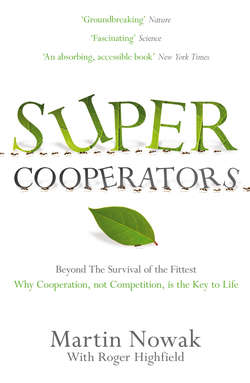Читать книгу SuperCooperators - Roger Highfield - Страница 31
На сайте Литреса книга снята с продажи.
THE MORAL SPECTRUM
ОглавлениеLet’s examine one subtlety of my computer simulation of indirect reciprocity. If you see a Bad Samaritan and refuse to help him, you yourself could end up looking like another Bad Samaritan who in turn would be rejected by others (even though you had a very good reason to be a Bad Samaritan). A smarter rule should distinguish between justified and unjustified defections and should therefore take into account the reputation of the receiver too: someone withholding help from a “bad” player should not damage his own reputation as a result.
One way to extend the work Karl and I had done was to study the effects of these more sophisticated rules. To make the problem tractable, it helps to assume that there are only two kinds of reputation: good and bad. In this world of binary moral judgments there are four ways of assessing donors in terms of “first-order assessment”: always consider them as good, always consider them as bad, consider them as bad if they give and good otherwise, or consider them as good if they give and bad otherwise. Only the last option can lead to cooperation based on good reputation.
Second-order assessment rules take into account the reputation of the receiver too, so we are now able to consider the wider circumstances; as mentioned already, it can be deemed good to refuse help to a bad person. There are sixteen of these second-order rules. There are also third-order rules, which depend additionally on the score of the donor (after all, a person with a poor reputation might try to “buy” a good one by being more generous to those with good reputations). And so on. In all, there are 256 third-order rules.
Once we have assessed the players to the first, second, or whatever order we decide, we then have to work out what to do. Do we give help, or do we walk on by? This is decided by a so-called action rule. The action rule depends on the recipient’s score and on one’s own (there are four possible combinations of the two scores and thus a total of sixteen action rules). For example, you may decide to help if the recipient’s score is good or your own score is bad. You might reason that by doing this you might increase your own score and therefore increase the chance of receiving help in the future.
A strategy is the combination of an action rule and an assessment rule. Given the above, we obtain 16 times 256, which is 4,096 strategies. That is a lot. Nonetheless, this universe of strategic possibilities has been explored in a remarkable study at Kyushu University in Fukuoka that was the basis of the doctoral thesis of a brilliant theoretician, Hisashi Ohtsuki, who will also feature in later chapters.
Ohtsuki’s adviser was the formidable Japanese mathematical biologist Yoh Iwasa. During my first visit to Japan, almost every person I met had introduced himself or herself as being a student of Iwasa. I became curious about this beacon of inspiration. I wanted to meet the professor who was “the number one in Japan.” Yoh himself always jokes that, while most Japanese names mean “the great” or “the brilliant,” his actually means only “the mediocre.” But again he’s being modest. In fact, his name signifies “the golden mean,” the most desirable position of perfect balance. He and his students are a major force in theoretical biology.
In search of the perfect balance of qualities to ensure that indirect reciprocity helps us all to get along, Ohtsuki and Iwasa analyzed all 4,096 possible strategies and proved that only eight of them are evolutionarily stable and can lead to cooperation. The leading strategies share some characteristics: cooperation with a good person is regarded as good, while defection against a good person is regarded as bad. In other words, as one would suspect, they differentiate between justifiable and nonjustifiable defection, that is, they discriminate against Bad Samaritans. If a good donor meets a bad recipient, the donor must defect and this action does not reduce his reputation. Instead, it is seen as a “justified sanction.” Similar problems were also explored by Karl Sigmund and Hannelore Brandt in Vienna.
There are still many open questions regarding indirect reciprocity. To illustrate one of them, consider the following scenario, one that seems relevant to today’s celebrity-obsessed culture, in which people are now famous for being famous. If I help someone with the sole purpose of increasing my reputation, what then? We place a major emphasis on not only monitoring what other people do, but also on understanding their motives. If they do something flamboyant and showy without any real concern for the well-being of others, then something is wrong. I find this unanswered question fascinating and it brings us back to the Gandhi quotation at the start of this chapter.
